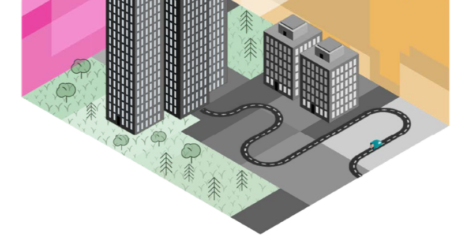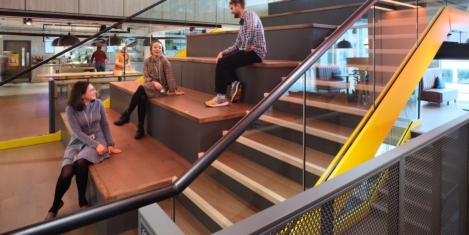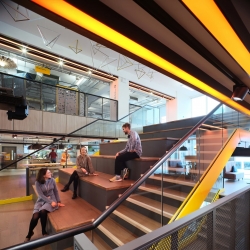May 17, 2022
Circular economy accelerator launched to address role of built environment in climate change
 The World Green Building Council (WorldGBC) and its network of over 70 Green Building Councils have launched a Circularity Accelerator — a global programme that sets out to accelerate the adoption of circular economy and resource efficiency principles in the building and construction sector. Last week, the United Nations (UN) reported we have a 50 percent chance of exceeding 1.5°C of global heating in the next five years. Between the UN Climate Summit of COP21 in Paris and COP26 in Glasgow, the global economy consumed 70 percent more raw materials than the Earth can safely replenish. More →
The World Green Building Council (WorldGBC) and its network of over 70 Green Building Councils have launched a Circularity Accelerator — a global programme that sets out to accelerate the adoption of circular economy and resource efficiency principles in the building and construction sector. Last week, the United Nations (UN) reported we have a 50 percent chance of exceeding 1.5°C of global heating in the next five years. Between the UN Climate Summit of COP21 in Paris and COP26 in Glasgow, the global economy consumed 70 percent more raw materials than the Earth can safely replenish. More →
















 Six workplaces across the North of England and Northern Ireland have been recognised at the annual British Council for Offices (BCO) Regional Awards today. The Northern BCO Awards dinner returned in-person to the Kimpton Clocktower in Manchester, recognising the North’s highest quality developments and setting the standard for excellence in the office sector across the UK.
Six workplaces across the North of England and Northern Ireland have been recognised at the annual British Council for Offices (BCO) Regional Awards today. The Northern BCO Awards dinner returned in-person to the Kimpton Clocktower in Manchester, recognising the North’s highest quality developments and setting the standard for excellence in the office sector across the UK. 
 Six London workplaces have been recognised at the annual British Council for Offices’ (BCO) Regional Awards. The London Awards Lunch returned in-person to the London Hilton on Park Lane, recognising the highest quality developments in London and setting the standard for excellence in the office sector across the UK. The winning workplaces include: 80 Charlotte Street (Commercial Workplace); Plumtree Court, 25 Shoe Lane (Corporate Workplace); Dojo, The Brunel Building, 2 Canalside Walk (Fit Out of Workplace); ASOS HQ, Greater London House, 180 Hampstead Road (Refurbished/Recycled Workplace); Pennybank , 33-35 St John’s Square (Projects up to 1,500m sq. ); 1 Triton, 1 Triton Square, Regent’s Place (Innovation)
Six London workplaces have been recognised at the annual British Council for Offices’ (BCO) Regional Awards. The London Awards Lunch returned in-person to the London Hilton on Park Lane, recognising the highest quality developments in London and setting the standard for excellence in the office sector across the UK. The winning workplaces include: 80 Charlotte Street (Commercial Workplace); Plumtree Court, 25 Shoe Lane (Corporate Workplace); Dojo, The Brunel Building, 2 Canalside Walk (Fit Out of Workplace); ASOS HQ, Greater London House, 180 Hampstead Road (Refurbished/Recycled Workplace); Pennybank , 33-35 St John’s Square (Projects up to 1,500m sq. ); 1 Triton, 1 Triton Square, Regent’s Place (Innovation) 















May 23, 2022
The future of work isn’t what it used to be
by Mark Eltringham • Comment, Technology, Workplace design